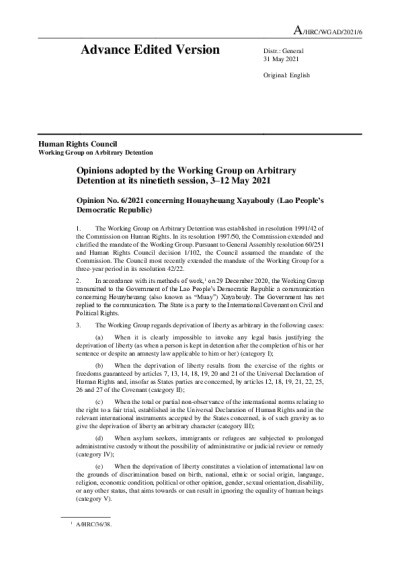
Date
Geographical Area
South East Asia
Countries
Laos
Keywords
Case Name
Opinion No. 6/2021 concerning Houayheuang Xayabouly (UNWGAD)
Case Reference
A/HRC/WGAD/2021/6
Name of Court
UN Working Group on Arbitrary Detention
Key Facts
On 23 July 2018, a hydroelectric power dam collapsed in Laos causing flooding in villages, displacement of over 5,000 people, deaths and disappearance of people. Ms. Houayheuang Xayabouly (hereinafter “the complainant”), an environmentalist and human rights defender, produced and disseminated videos on social media in which she highlighted the impact of the dam collapse on affected communities and criticised the government’s slow response in helping affected people. She recommended emergency response training for authorities.
A year later, around August and September 2019, tropical storms caused flooding and displacement which exposed the government’s inability to cope with the emergency. Again, the complainant produced and shared videos on social media complaining about the slow pace of rendering relief and bemoaning the government’s failure to learn from previous flooding experience. Her content recorded over 173,000 views.
A week later, she was arrested on 12 September 2019 and detained on charges of spreading propaganda against the Lao People’s Democratic Republic contrary to s.117 of the Criminal Code. On 17 September 2019, an official press release indicated that she had admitted to the offence of criminal defamation.
She was tried in court, convicted, and sentenced to the maximum penalty under Laos’ Criminal Code. She subsequently communicated with the UN Working Group on Arbitrary Detention (UNWGAD) to raise a complaint against her detention.
A year later, around August and September 2019, tropical storms caused flooding and displacement which exposed the government’s inability to cope with the emergency. Again, the complainant produced and shared videos on social media complaining about the slow pace of rendering relief and bemoaning the government’s failure to learn from previous flooding experience. Her content recorded over 173,000 views.
A week later, she was arrested on 12 September 2019 and detained on charges of spreading propaganda against the Lao People’s Democratic Republic contrary to s.117 of the Criminal Code. On 17 September 2019, an official press release indicated that she had admitted to the offence of criminal defamation.
She was tried in court, convicted, and sentenced to the maximum penalty under Laos’ Criminal Code. She subsequently communicated with the UN Working Group on Arbitrary Detention (UNWGAD) to raise a complaint against her detention.
Decision and Reasoning
Among the issues for determination was whether the complainant’s conduct, of creating social media posts criticising the government’s response to floods and negative impact on affected populations in her country, was protected under the Universal Declaration of Human Rights (UDHR) and the International Covenant on Civil and Political Rights (ICCPR).
The respondent government had the evidential burden of refuting the prima facie credible allegations.
The UNWGAD noted that freedom of expression under article 19(2) ICCPR includes “political discourse, commentary on public affairs, and discussion of human rights, and protects internet-based modes of expression. It protects holding and expression of opinions, including those that are critical of, or not in line with, government policy.” The UNWGAD held that the social media posts were found to fall within the right to freedom of expression. Additionally, the complainant’s actions were found to be within the exercise of her right to take part in the conduct of public affairs protected under article 21 UDHR and article 25(a) ICCPR. This was because her videos commented on the impact of flooding from tropical storms, displacement of villagers and the need for disaster preparedness on the part of government officials.
The respondent government had the evidential burden of refuting the prima facie credible allegations.
The UNWGAD noted that freedom of expression under article 19(2) ICCPR includes “political discourse, commentary on public affairs, and discussion of human rights, and protects internet-based modes of expression. It protects holding and expression of opinions, including those that are critical of, or not in line with, government policy.” The UNWGAD held that the social media posts were found to fall within the right to freedom of expression. Additionally, the complainant’s actions were found to be within the exercise of her right to take part in the conduct of public affairs protected under article 21 UDHR and article 25(a) ICCPR. This was because her videos commented on the impact of flooding from tropical storms, displacement of villagers and the need for disaster preparedness on the part of government officials.
Outcome
The UNWGAD concluded that: “Ms. Xayabouly’s detention resulted from the peaceful exercise of her rights to freedom of expression and to take part in the conduct of public affairs, and was contrary to article 7 of the Universal Declaration of Human Rights and article 26 of the Covenant. Her detention is arbitrary under category II.”
The language of s.117 of the Criminal Code of 2018 was found to offend the principle of legality for being vague and overly broad. It proscribed peaceful exercise of rights. No trial should have taken place.
The language of s.117 of the Criminal Code of 2018 was found to offend the principle of legality for being vague and overly broad. It proscribed peaceful exercise of rights. No trial should have taken place.
Link
Disclaimer
This case law summary was developed as part of the Disaster Law Database (DISLAW) project, and is not an official record of the case.
Document
Document